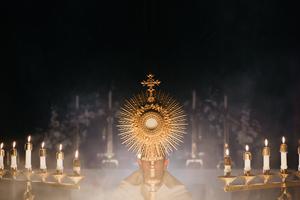US ‘Eucharistic Revival’ to Begin in 2022: ‘We Want to Start a Fire’ of Devotion, Says Bishop
Auxiliary Bishop Andrew Cozzens of St. Paul and Minneapolis and chair of the bishops’ evangelization committee, presented the plan to his fellow bishops during their virtual spring meeting June 18.

The bishops of the United States discussed on Friday a program of “Eucharistic Revival” that will aim to foster deeper devotion and knowledge about the Eucharist nationwide beginning next summer.
Auxiliary Bishop Andrew Cozzens of St. Paul and Minneapolis and chair of the bishops’ evangelization committee, presented the plan to his fellow bishops during their virtual spring meeting June 18. He told CNA that the program aims to support and “start a fire” of devotion to the Eucharist with a particular focus on the local level — dioceses, parishes and families.
Bishop Cozzens said the initiative will aim to launch a “three-year period of revival” nationwide, with a special focus on the local level, bringing the focus of Eucharistic revival to “any parish that desires it.”
He also said the idea of a nationwide Eucharistic revival has been met with “incredible enthusiasm” already. He noted that many Catholic donors, media organizations and volunteers across the country have pledged support.
“One of the signs that the Holy Spirit is behind this is the incredible reception that so many different apostolates and movements have given to this idea,” Bishop Cozzens told CNA.
“Everybody wants to help, which is a sign to me that the Holy Spirit’s really doing something.”
The development of the plan was spurred by a 2019 Pew Research study, the results of which suggested that only about one-third of U.S. Catholics believe the Church’s teaching that the Eucharist is truly the Body and Blood of Christ.
The pandemic delayed the plan, Bishop Cozzens said, but also made it “even more important,” given the pandemic’s as-yet-unknown long-term impact on Mass attendance.
The three-year Eucharistic Revival program will include three tiers: parish, diocesan and nationwide.
Beginning in July 2022, dioceses across the country will be encouraged to hold Eucharistic events and make the Eucharist a primary focus. The bishops aim to provide free teaching materials on the Eucharist, developed with the help of various catechetical partners, as soon as possible to assist dioceses in this, Bishop Cozzens said.
Following that, in July 2023, parishes will be encouraged to do the same. Bishop Cozzens said they want to encourage “grassroots creativity” and embrace diverse Eucharistic traditions to help parishes foster a greater love for the Eucharist among their members. Parish-level initiatives could include offering teaching Masses and small-group formation.
Throughout the presentation, Bishop Cozzens repeatedly emphasized the importance of spreading the practice of Eucharistic adoration, especially since he has seen the positive impact that adoration continues to have on young people.
“There's a strong sense among those who work with young people that that encounter [with Jesus] happens profoundly through Eucharistic adoration,” Bishop Cozzens said.
“We want to encourage every parish to think about increasing Eucharistic adoration as part of the life of this revival,” he said.
The revival would culminate in summer 2024, with a Eucharistic celebration event, held in a major city, that would serve as a pilgrimage site. Bishop Cozzens said the bishops are eyeing the Midwest as a location because of its accessibility, as well as some cities in the South; final approval for such an event would come from the body of U.S. bishops in November.
Calling the plan a “once in a generation” opportunity to impact faith life, Bishop Cozzens said the plan aims to create “Eucharistic missionaries,” people who go out to spread devotion to the Eucharist to new places, what Pope Francis calls “the margins.”
Bishop Cozzens said the bishops plan to reach out to all of the country’s Catholic universities to invite them to participate. He said he suspects some colleges will decline, but he hopes many will take them up on the offer.
“I want to have Eucharistic processions on every campus. And we have campus ministries that are ready to do that across the nation,” he said.
Auxiliary Bishop Robert Barron of Los Angeles asked Bishop Cozzens during the meeting whether he thought the timeline for the project could be sped up, in order to start the revival as soon as possible.
Bishop Cozzens responded by noting that many dioceses, such as Atlanta and St. Augustine, are starting “Eucharistic revivals already, and they should continue to do so as soon as they would like to. The bishops’ plan is designed to support, not replace, efforts at Eucharistic revival at the local level,” he said.
The plan for a Eucharistic Revival comes soon after the U.S. bishops on Thursday debated drafting a teaching document on the Eucharist, which would include a subsection on “Eucharistic coherence,” or worthiness to receive Communion.
In a proposed outline of the document, the bishops’ doctrine committee cited the special need for Catholic public officials to uphold Church teaching in public life, but stressed that they are not drafting any national policy of denying Communion.
- Keywords:
- usccb
- national eucharistic revival
- u.s. bishops conference
- Eucharistic consistency
- Eucharistic coherence
















